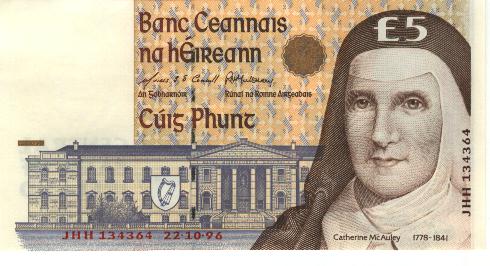The United States Treasury Department released information yesterday evening indicating plan to replace the image of Alexander Hamilton on the $10 bill as part of the previously determined plan to have the $10 bill edited by the year 2020. Hamilton's image would be replaced by the image of a female who has yet to be determined.
I have no problem with the incorporation of a female image into a prominent place within one of the commonly used pieces of paper currency within our country. A country's currency is one of the best ways to show and stress that which is valued within that society. I had the opportunity to visit Ireland in 1999 prior to the country switching over to the Euro. I was stricken by the fact that the people featured on the Irish Punt were not famed political leaders as is so common elsewhere (during the same trip I had visited the United Kingdom--every paper bill features the current monarch, Queen Elizabeth II).
 |
| Catherine McAuley, founder of the Sister of Mercy |
 |
| James Joyce, novelist and poet |
I was pleased with the online reports of a movement earlier this year to hold an unofficial competition to select the ideal female candidate to be selected for use on a piece of paper currency within the United States. Perhaps it was this movement which has inspired the Treasury Department's design to make such a change on the next piece of paper currency which has already slated for an edit. However, it seems to me that the Treasury Department failed to pay attention to the rationales behind the specific bill which was the "target" for the female image movement.
Andrew Jackson is a prime example of a historic figure to whom I refer as a "complex character" in American history. Yes, he is the hero of the Battle of New Orleans (War of 1812), he is the champion of the common man, and the era of his influence saw an expansion of democratic ideals and virtually universal suffrage for white men. And yet...much of his military fame following the Battle of New Orleans is connected with fighting the Seminoles in Florida. There is the ardent attacks of the Second Bank of the United States and the veto of its recharter which led to a major economic panic/depression shortly after he left office. And, of course, there is the entirety of the saga of Indian Removal...even though the worst of the "Trail of Tears" experiences occurred following the conclusion of his time as President they are still intricately linked with policies created by he and his administration. Andrew Jackson's policies regarding American Indians and the movement of the Southeastern tribes to lands west of the Mississippi River outweigh, by far, any of his redeeming qualities (much like Nixon...his foreign policies which brought greater peace with China and the Soviet Union are overshadowed by Watergate).
In my opinion, it is Jackson who should be replaced on the $20 bill rather than Alexander Hamilton on the $10 bill. Hamilton, in a similar spirit as with Jackson, is a self-made man born into lowly circumstances. He emerged as one of the heroes of the American Revolution (a close aide to General Washington) and of the founding era. While serving as the country's first Secretary of the Treasury under President Washington, Hamilton's financial programs helped set the fledgling country on a stable course; much of our modern fiscal policies are directly linked with the success of his early ideas--even though each Jefferson and Jackson were anti-National Bank we do still have a centralized "bank-like" institution which fits in best with the spirit of Hamilton. If we are going to have famed politicians on our MONEY, the man who is chiefly responsible for our national economic policies is certainly a figure to be honored.
So, in order to take a step toward greater gender equality in honoring those of our country's past, let's replace someone more commonly associated with the negative events of the our past rather than the one whose policies we still use on a daily basis.
Give Jackson the ax on the $20 but keep Hamilton.

No comments:
Post a Comment